
Porky in Wackyland is a 1938 Warner Bros. Looney Tunes animated short film, directed by Bob Clampett. The short was released on September 24, 1938, and stars Porky Pig venturing out to find the last do-do bird, which he finds in Wackyland, a land that makes no sense located in Darkest Africa.

The CooCoo Nut Grove is a 1936 Warner Bros. Merrie Melodies short animated film, set in the famed Cocoanut Grove of the Ambassador Hotel in Los Angeles. This is a caricature cartoon, with recreations of celebrities from the time. The cartoon was directed by Friz Freleng, with animation by Robert McKimson and Sandy Walker, caricature design by T. Hee, and musical score by Carl Stalling. The short was released on November 28, 1936.

I Love to Singa is a 1936 Warner Bros. Merrie Melodies animated cartoon directed by Tex Avery. The short was released on July 18, 1936.
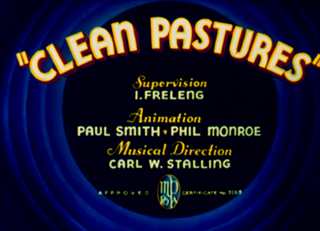
Clean Pastures is a 1937 Warner Bros. Merrie Melodies cartoon directed by Friz Freleng. The short was released on May 22, 1937.
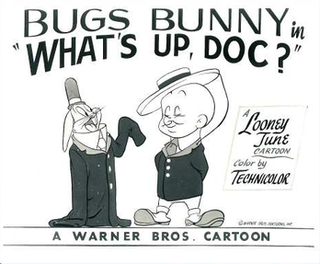
What's Up, Doc? is a Looney Tunes cartoon directed by Robert McKimson and produced by Warner Bros. Cartoons. It was released by Warner Bros. Pictures on June 17, 1950 and stars Bugs Bunny and Elmer Fudd.

Bunny Hugged is a 1951 Warner Bros. Merrie Melodies short, directed by Chuck Jones and written by Michael Maltese. The short was released on March 10, 1951, and stars Bugs Bunny. Bunny Hugged is essentially a re-working of Jones' 1948 short Rabbit Punch, substituting wrestling for boxing.
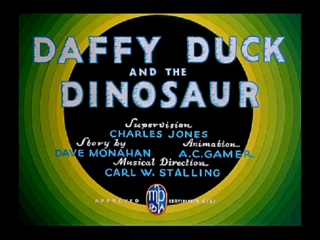
Daffy Duck and the Dinosaur is a 1939 Warner Bros. Merrie Melodies animated cartoon short directed by Chuck Jones. The cartoon was released on April 22, 1939, and is the first Daffy Duck cartoon directed by Jones.

Hollywood Steps Out is a 1941 Warner Bros. Merrie Melodies cartoon short directed by Tex Avery and produced by Leon Schlesinger. The short was released on May 24, 1941.

The Wearing of the Grin is a 1951 Warner Bros. Looney Tunes cartoon directed by Chuck Jones and written by Michael Maltese. The short was released on July 14, 1951, and stars Porky Pig.
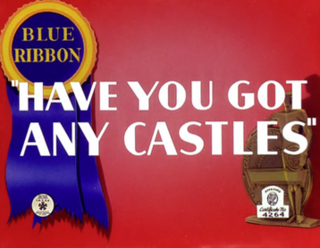
Have You Got Any Castles is a 1938 Warner Bros. Merrie Melodies cartoon directed by Frank Tashlin. The short was released on June 25, 1938. Characters from well-known works of literary fiction come to life inside of a library after hours.

Hittin' the Trail for Hallelujah Land is a 1931 Warner Bros. Merrie Melodies animated cartoon directed by Rudolf Ising. The short was released on November 28, 1931, and stars Piggy.
Run, Run Sweet Roadrunner is a 1965 Warner Bros. Merrie Melodies cartoon directed by Rudy Larriva. The short was released on August 21, 1965, and stars Wile E. Coyote and the Road Runner.
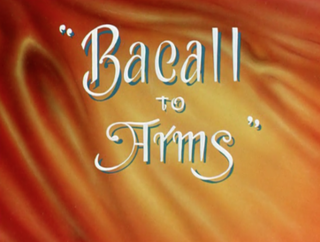
Bacall to Arms is a 1946 Warner Bros. Merrie Melodies series short planned by Bob Clampett and finished by Arthur Davis, in his second-to-last cartoon at Warner Bros. The short was released on August 3, 1946.
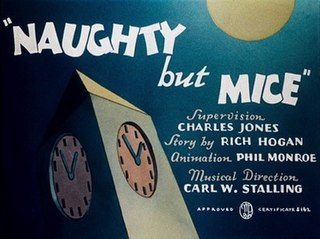
Naughty but Mice is a 1939 Warner Bros. Merrie Melodies cartoon directed by Chuck Jones. The short was released on May 20, 1939, and stars Sniffles in his cartoon debut.
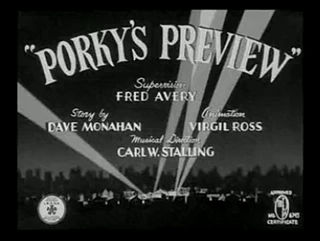
Porky's Preview is a Warner Bros. Looney Tunes cartoon directed by Tex Avery. The short was released on April 19, 1941, and stars Porky Pig.
Often an Orphan is a 1949 cartoon in the Merrie Melodies series. The cartoon was released on August 13, 1949 and stars Charlie Dog and Porky Pig.
Goofy Groceries is a 1941 Warner Bros. Merrie Melodies animated short film directed by Bob Clampett. The short was released on March 29, 1941.
Malibu Beach Party is a 1940 Warner Bros. Merrie Melodies cartoon directed by Friz Freleng. The short was released on September 14, 1940.
Ali-Baba Bound is a 1940 Warner Bros. Looney Tunes cartoon directed by Bob Clampett. The short was released on February 10, 1940, and stars Porky Pig.














